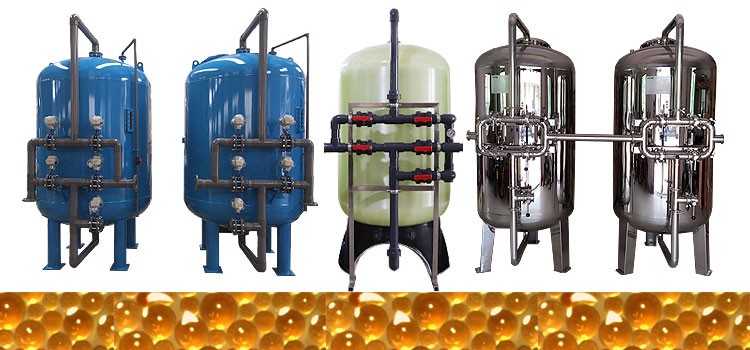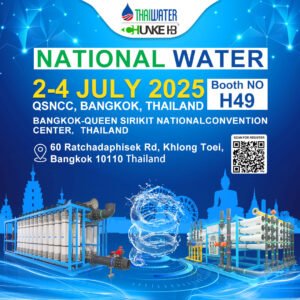Industrial Water Softener Systems

CHUNKE’s industrial water softener systems treat the water by removing hardness using resin. So, the resin replaces the hardness in the water with salt which is regenerated periodically. The softened water can then pass through an RO system to remove the salt without the risk of scaling. You can use softener in a variety of services including: industrial, municipal, and institutional applications. We offers FRP, Stainless Steel 304, 316 and carbon steel water softener tank.
What is industrial water softener systems?
Industrial water softeners treat your water for industrial use by removing hardness from the water using resin. The resin acts as industrial hard water treatment and replaces the hardness in the water with salt (brine), that is regeneration periodically. This process is ion exchange, and removes harsh manganese, iron, calcium, and magnesium ions from your incoming water supply. With softening, you will use less chemical, see reduced hard water build-up, save on repairs from unnecessary wear and tear to industrial equipment, and be able to conduct business more effectively. From complex manufacturing to simple applications where soft water is essential.
CHUNKE offers a full line of standard and fully-customizable water softening systems. And offers comprehensive maintenance of your industrial, commercial, or municipal softener system.
How to decide size of industrial water softener systems' tank?
Exchange capacity: which is the quantity of water delivering between regenerations, and it depends upon the amount of ion exchange resin in the softener and quantity of salt used for resin regeneration.
Maximum flow rate: which is the maximum quantity of water neccessary at any peak usage period, and is an important datum in case of non-continuous water delivery and is measuring in liter per hour (LPH).
Benefits and Features of industrial water softener systems:
Industrial water softeners soften water by decreasing the level of minerals present in hard water. Therefore, protecting the pipes, fixtures, appliances, and human health from lime scaling damage. Soft water drastically reduces energy, unnecessary repair & replacement, and water bills accordingly. The cleaning results with soft water are also high. Some of the benefits include:
Lower Chemical Consumption and Costs:
Water softeners remove hardness from water. So, it accomplishes through the action of other chemicals present in the water softener, which neutralize the chemicals in hard water.
Increased Equipment/Appliance Life:
Hard water has a negative impact on the apparatus and equipment with which it comes into contact. It corrodes metal pipes and causes buildup in pipes, which can cause them to burst, resulting in infrastructure damage. You can avoide all of these effects by using industrial water softeners, which ensure that only clean water is supplied and increase the life-span of the equipment or appliances.
Improved Consistency in Water Quality:
Industrial water softeners do much more than soften water, they also ensure that the water is safe to drink. Drinking water is always required in a manufacturing plant, factory, or hospital, and the use of an industrial water softener provides free drinking water consequently.
Reduced Repair and Maintenance costs:
Proper maintenance practises are critical for extending the shelf life of all products, and these practises are especially important when such a machine or device is costly. Hence, there may be costs associated with facilitating maintenance, such as replacing chemicals, and because industrial water softeners consume less, the cost of maintaining them is lower in reverse osmosis ro plant.
Reduce scalling problems:
Hard water causes lime scaling which is a chalky layer of calcium and magnesium bicarbonate. This layer gets deposited on kitchen sink, bathroom tiles, faucets, utensils, and pipes through which the water passes. Water softener decreases the prevents scaling and any kind of layer formation.
Clogged pipelines are also an issue due to lime scaling. Minerals in the hard water get deposited on the walls of the pipes and block the waterway. This reduces the flow rate of the water and can also cause leakage or permanent damage to the pipes. Water softener reduces the mineral levels preventing the damages.
Save energy, water & appliances:
As mentioned above, hard water causes scaling. This can happen in water heaters and other appliances that use water. If lime scales form in water heaters, energy intake would increase. Before water, the heater has to heat the scale. So, energy consumption is higher as the heater has to work longer than required. Moreover, hard water can cause leakage in the water heater and pipes as it damages them.
Hard water is to be more harmful to your appliances than human health. It can reduce the longevity and performance level of the appliances. Water softeners decrease the mineral levels in the water that cause lime scaling. The layers of calcium and magnesium deposits reduce. Therefore, appliances and pipe fittings last longer and perform better.
Hard water can stain and damage glassware. It also has the capacity to make them more prone to breaking easily. It reduces with the use of water softeners. Therefore, water softeners are very cost-effective.

